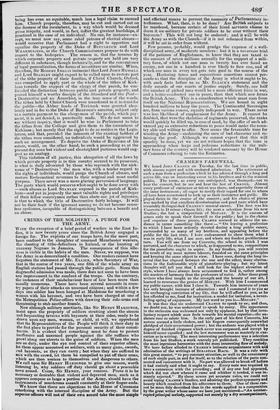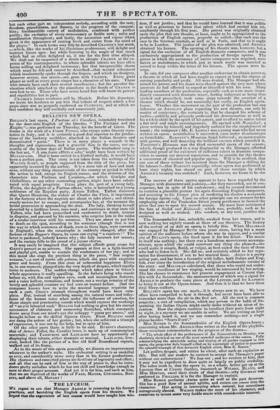CRAMER'S FAREWELL.
WE heard JOHN CRAMER on Tuesday, for the last time in public, with sincere regret and with unabated admiration. The retirement of such a man from a profession which he has adorned through a long and active life, was an interesting event to his brethren and to the musical public. The room, as every one anticipated, was thronged—not to hear the concert, but to see and hear the last of CRANIER. Almost every professor of eminence or talent was there, and especially those of the same instrument ; all eager to testify their regard for one to whom all have been accustomed to look up as their instructor and guide. He played thrice in the course of the concert ; and his choice of pieces was marked by that excellent discrimination and good taste which have invariably distinguished CRAMER'S musical career. The first was his Concerto in D minor ( Opera 16); the next a selection from his new Studies ; the last a composition of MOZART. It is the custom of actors only to speak their farewell to the public ; but in the choice and sequence of these pieces, CRAMER seemed to address the au- dience in terms something like these — " On leaving a profession to which I have been ardently devoted during a long public career, surrounded by so many of my brethren, and appearing before the public for the last time, I have endeavoured to show them what I was in early life, what I am now, and where my fondest predilections turn. You will see from my Concerto, the school in which I was nurtured, and the character to which, as it appeared to me, compositions for the pianoforte ought to aspire. In my Studies, you will receive the result of my most mature labours, founded on the same principles and keeping the same object in view. I have seen, during the long In- terval that has elapsed between the one and the other, many alterna- tions in the fashionable style of pianoforte-playing ; but my .latest thoughts will tell you that I still look for the highest elevation of style, where I have always been accustomed to find it, rather among the masters of harmony than the professors of noise. After those great writers who first taught us the strength and the beauty of our art, I learned to reverence the genius of MozArcr. With him I commenced my public career, with him I close it. Towards him increase of years has only brought increase of admiration : and I commend it to you as the unchanging conviction of my life, that he will afford to you, as he has afforded to me, food for instruction, a model for imitation, a never- failing spring of enjoyment. My last word to you is—MOZART." It was thus that we understood CRAMER to speak to us; and thus, we doubt not, he was understood to speak by many. His appearance in the orchestra was welcomed not only by applause, but by that invo- luntary respect which man feels towards his mental superior—the au- dience rose to salute him. In the early part of his first Concerto, his nerves seemed a little shaken, and his fingers consequently somewhat abridged of their accustomed power; but the andante was played with a degree of finished elegance which never was surpassed, and except by himself never equalled ; and the last movement was as masterly in exe- cution as in writing. The most interesting performance was a selection from his last Studies, a work scarcely yet published. They combine the most ingenious harmonies with the most interesting flow of melody. We have before alluded to CRAMER'S intimate acquaintance with and admiration of the writings of SEBASTIAN &sett. It was a rule with this great master, " to pay constant attention, as well to the consistency of each single part, in and for itself, as to the relation of the parts con- nected and concurrent with it. No part was allowed to break off before it had entirely said what it ought to say. Every note was required to have a connexion with the preceding ; and if any one had appeared, which did not show whence it came and whither it tended, it was in- stantly rejected." By these severe yet accurate rules, we could not avoid trying CRAMER'S Studies, and admiring the perfect symmetry and beauty which resulted from his adherence to them. One of these can- not be more fitly described than in the words applied to a composition by the great writer whose name we have just mentioned—"An uninter- rupted principal melody, supported not merely by a dry accompaniment,
but each other part an independent melody, according with the rest; freedom, gracefulness, and fluency, in the progress of the composi- tion; inexhaustible variety of modulation, combined with perfect purity; the exclusion of every unnecessary or feeble note ; unity and combination throughout; and lastly, the animation and vigour which gives it the appearance of coming fresh and entire from the mind of the player." In such terms may fitly be described CRAMER'S last work, .--which, like the works of his illustrious predecessor, will delight and instruct future ages : but while listening to the magic of that touch which had so often delighted us, it was for the first time alloyed. We shall not be suspected of a desire to elevate CRAMER at the ex- pense of his contemporaries, to whose splendid talents we have often borne willing and delighted testimony; but that inexpressible charm which must be felt and cannot be described—that mental refinement which involuntarily spoke through the fingers, and which no drudgery, however severe, can attain—are gone with CRAMER. Every great player as well as every great singer has a character of his own. Those who remain have each their several excellencies ; but the peculiar fas- cination which attached to the pianoforte in the hands of CRAMER is MOW lost to us. Those who have never heard him will know its powers and capabilities but in part. Citasma's future residence will be Munich. Before his departure, we invite his brethren to pay him that tribute of respect which a few years since was so properly conferred on CLEMENT!, and in which we feel confident they will cordially and numerously join.



























 Previous page
Previous page